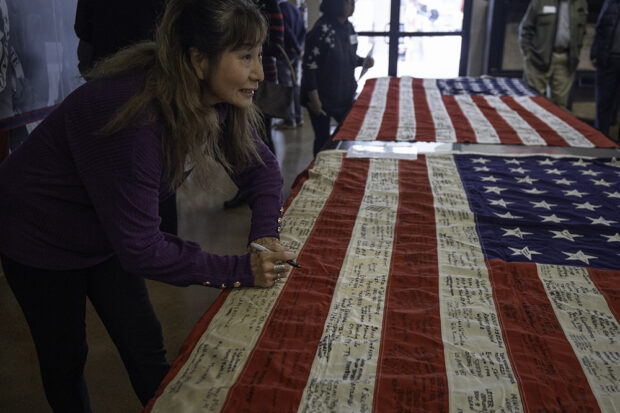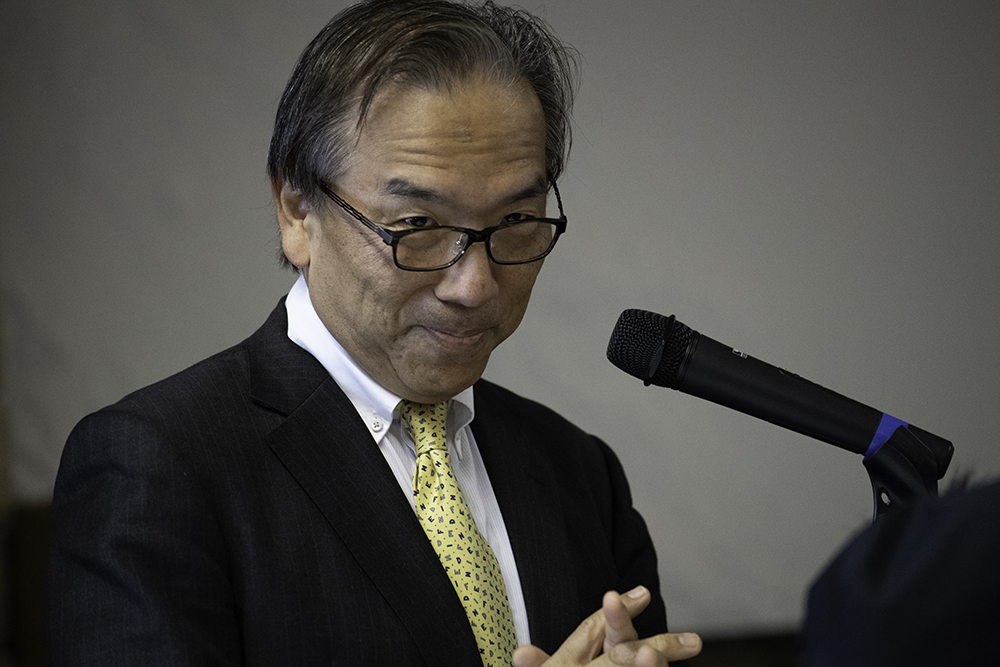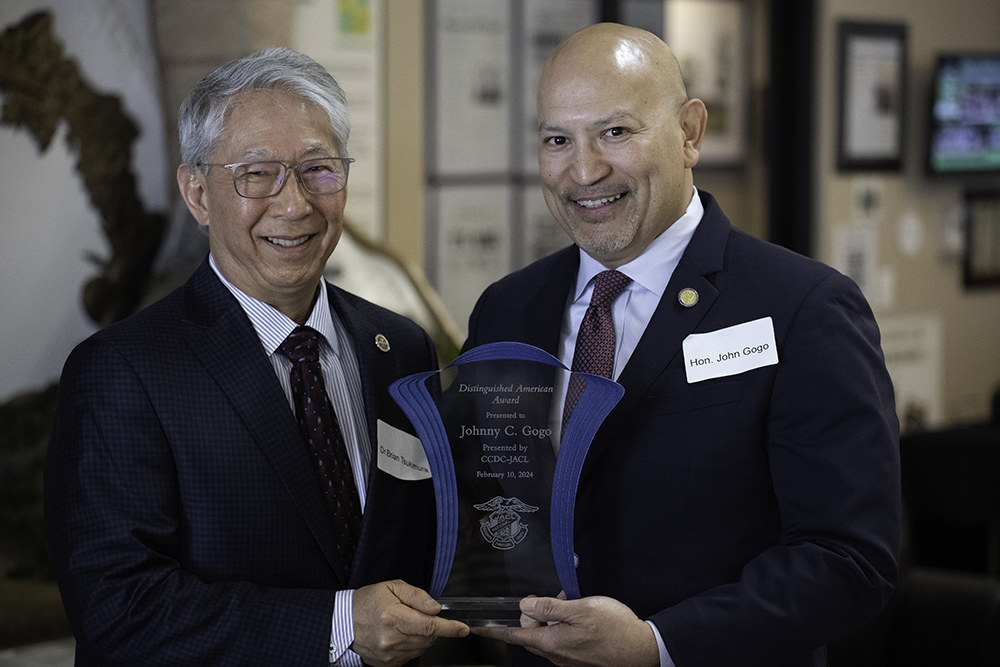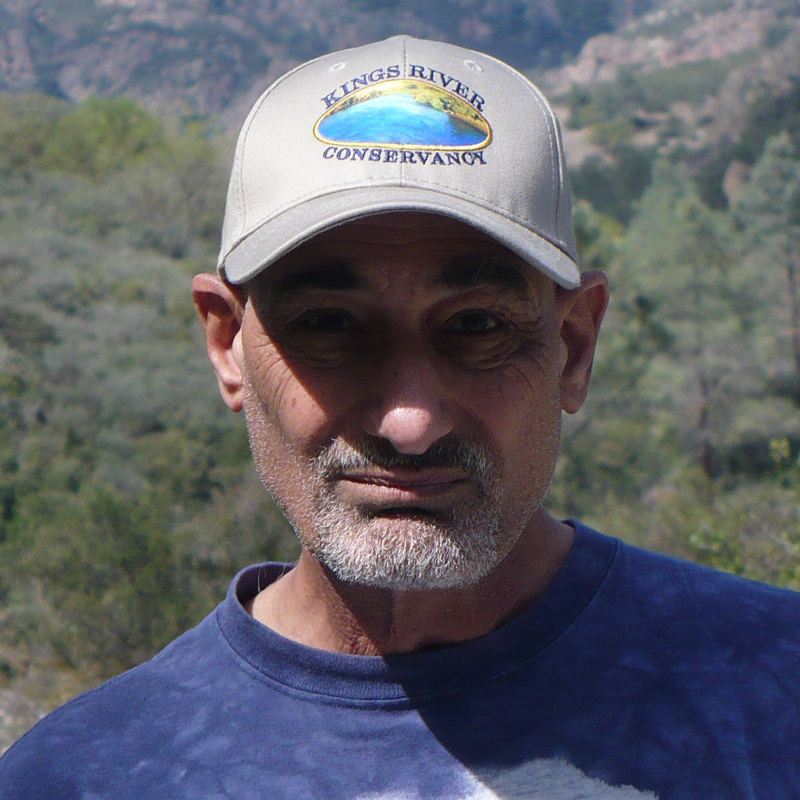

It was an historically ironic location for the Japanese American Citizens League’s annual Day of Remembrance—the Fresno Fairgrounds, where thousands of American citizens were held for months living in horse stalls at the Fresno Assembly Center while concentration camps for them were being constructed throughout the western states. They just happened to be Americans of Japanese heritage.
On that fateful day of Feb. 19, 1942, the lives of those Japanese Americans who had created communities in the fertile San Joaquin Valley changed forever. Executive Order 9066 was signed into law that day by President Franklin D. Roosevelt, beginning what was surely one of the most heart-rending chapters of American history.
Soon, 120,000 people living in the western states unjustly lost their freedom and their rights as American citizens only because their families came here from Japan.

Observing the Day of Remembrance in 2024 was not an occasion for sadness. It was a time of reflection, camaraderie, catching up with old friends and greeting new ones. The event was both solemn and joyful as it echoed the pain and trauma of the past as well as hopefulness for the future.
There was no hint of bitterness, at least openly, but rather a sense of pride in being survivors and a sense of accomplishment for all that Japanese Americans have contributed to the Valley and the nation. Here in the San Joaquin Valley those achievements are profound and abundant.
Founded in 1929, the Japanese American Citizens League (JACL) is primarily concerned with social justice. Over the years, it has advocated for civil rights and fought racism. It is a robust organization with headquarters in San Francisco and 10,000 members in more than 100 chapters nationwide.
The JACL conducts educational programs to eradicate hate and prejudice, combats negative stereotypes used against Asians and Pacific Islanders, and even provides college scholarships. Lately, it has been active in combating the most recent upsurge of anti-Asian bigotry.
Opening remarks for the Day of Remembrance by Consul General of Japan Yo Osumi spanned the intimate connection that exists between the two Pacific nations and cultures. Since coming to San Francisco for his assignment, Osumi said he has learned much about the Japanese American experience, “I learned a lot about the history, and I learned that to celebrate the Day of Remembrance we gather here to honor those who suffered, struggled and overcame that injustice.”
He also learned how important Japanese immigrants were to the state, “As of 1930, California was home to 40 Japan towns from San Diego to Sacramento and further north, and in Fresno alone that’s over 5,000 Japanese Americans living, working and contributing to the community.”
Osumi emphasized the value of remembering, saying, “Preserving history is making sure that it’s shared with future generations. At the end of the day, the crucial points to remember are that human rights were violated and due process under the laws disregarded.”
Understanding the past, Osumi stressed, is the key to the future, “Across the world today, both the United States and Japan are strong advocates of supporting human rights abroad and upholding the rule of law, working in conjunction to advocate for democratic systems of government and finding programs focused on alleviating poverty and preventing conflict.”
Memorializing the struggles faced by Japanese Americans in that dark period, Rep. Jim Costa (D–Fresno) bemoaned the executive action forcing Japanese families to leave their homes, farms and businesses “that they had with passion and desire established [as] a community for themselves and to make America a better country.”
It is a pattern all too familiar in American society, as Costa pointed out, “We have sinned before in our omission to recognize the critical nature of the contributions of immigrants to this country over generations. And sadly, different ethnic communities have had to persevere as they attempt to establish their roots.”
For rising above the trauma they endured, Costa praised Japanese Americans of that era, “I think it is entirely remarkable and says so much about the Japanese American in this country. In their pastime in these camps they played baseball, America’s pastime, even though their respect as citizens was put in question and in doubt.
“And then, of course, the 442nd Battalion (of Japanese American soldiers). When your country is basically imprisoning your families, quarantining your families, but yet you volunteer to serve your country in war. My gosh, what a statement that is.”
Every year, the local JACL confers their Distinguished American Award. This year it went to Judge Johnny Gogo, a Superior Court judge in San Jose. He launched a remarkable project aimed at educating the public about the history of the internment. He was inspired by meeting Fred Korematsu’s daughter Karen.
An American civil rights hero, Korematsu in 1942 refused to be interned. He tried to join the military as the United States entered the war but was turned away due to discrimination because he was Japanese.
At first, he worked as a welder in Oakland’s shipyards but was soon fired because of his ancestry. Korematsu ignored Executive Order 9066 and tried to live as a civilian by changing his name and appearance. Eventually, he was arrested and sent to a concentration camp.
He fought his legal case while interned at Topaz, Utah. The case went all the way to the Supreme Court, but he lost in 1944. Then in 1983, documents were discovered proving that Japanese Americans had never posed a threat to the country and that their internment was unjustified. Korematsu’s conviction was overturned later that year. He committed the rest of his life to working for social justice.
That meeting with Korematsu’s daughter compelled Judge Gogo to do something, “I thought that getting this 48-star American flag, asking those camp survivors to sign the flag, would be a fantastic way to honor their families’ memory, their families’ legacy, and certainly remember the struggle and the hardships and the heartache.”
The first to sign in 2021 was then Rep. Norman Mineta (D–San Jose), whose own family had been imprisoned. In this tribute to history, five of the 48-star flags, the kind that flew over the concentration camps, now have 1,000 emblazoned signatures of survivors.

Keynote speaker Kerry Yo Nakagawa traced the important role of baseball in the concentration camps. Like all Japanese Americans, he had his own unique family story.
Emigrating from Hawaii, the hardworking Nakagawa family set up shop in Fresno’s west side and farmed a 20-acre vineyard near Caruthers. In the 1920s, his grandmother owned a sushi restaurant while across the street his grandfather ran a hardware store.
With the coming of the war and internment, the businesses disappeared. Such losses devastated the successful lives of so many, Nakagawa recounts, “I always talk about how 48% of the cash crops in California, Oregon and Washington were controlled by Japanese American farmers. World War II came, and all of a sudden the Japanese towns, the banks, the restaurants, they all went away.”
The Nakagawa’s farm survived thanks to the neighboring Raven family, who took care of the land and even handed over a cigar box full of cash, the profits from the internment years. Most Japanese American families, however, lost everything they had worked so hard to achieve.
Baseball was a crucial element of the internment experience. Japanese Americans who came to the Valley were passionate about baseball, and in the early 1920s players organized teams and leagues up and down the state. Their love of baseball was so great that they immediately began constructing baseball diamonds and bleachers as soon as they were incarcerated.
Teams and leagues sprouted up in every internment camp, and there was fierce competition. Teams even went on the road to compete with players in other camps around the West. It was not just something to fill the days while interned.
Baseball had provided a powerful sense of pride and excellence and accomplishment for Japanese Americans in the prewar era. That continued and intensified with baseball played at a high level within the confines of barbed wire as thousands of fans cheered on their favorite teams.
It was uplifting to excel at their craft and to have fun as a counterweight to the daily grind of regimented prison life. It also must have been an ironic source of gratification that they were so good at the game that is considered America’s pastime. After the war, some of the players went on to star on high school and college baseball teams and at the professional level as well.
Nakagawa is on a mission. His goal is obtaining the recognition for Japanese American baseball players that they deserve. “I can compare a lot of our Issei and Nisei ball players that had major league ability. They had the tools, they had the passion.
“But unfortunately, during the 20s and 30s, because of the discriminatory laws and the Jim Crow laws at the time, if you were Asian, Latino or Black you weren’t going to play major league baseball.”
That has changed as players from Japan are now increasingly sought after by major league teams, and some veteran Japanese players such as Ichiro Suzuki head toward the Baseball Hall of Fame.
But that’s still not good enough, Nakagawa asserts, “Hopefully, one day we’ll get to the Baseball Hall of Fame permanently, like the All-American girls, the Negro Leagues and the Latinos in baseball. And that’s our goal. And to also have an enshrinement for one of our Nisei ball players like Kenichi Zenimura.”
Over the past quarter century, Nakagawa has curated a museum-style exhibit featuring Nisei baseball and has taken it far and wide, even having a temporary showing in Cooperstown (home of the Baseball Hall of Fame). He hopes that the exhibit will be recognized by the major league establishment with a permanent place in the Hall of Fame.
What is so impressive about the Day of Remembrance is the grace with which Japanese Americans have absorbed what was done to them, and how they have overcome that unforgettable experience. No other immigrant population has had to prove their loyalty and value to the nation in quite the same way. Their sacrifice should never be repeated.
Because Japanese Americans survived that dismal episode of history so positively, we are all a better and stronger people.

